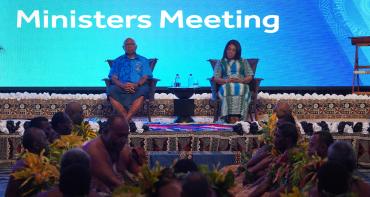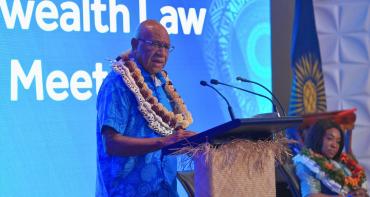Speaker: Commonwealth Deputy Secretary-General Mmasekgoa Masire-Mwamba
Let me thank UNDP for the invitation to be present here at this important consultation on the post-MDG framework. My presence here underscores the close working relationship between the Commonwealth Secretariat and UNDP as development partners.
The Commonwealth has a long lineage in developing and advancing global thinking in development. Poverty reduction as well as sustainable growth and development are central pillars of the association’s work and one that binds all members.
Over many years the Commonwealth has sought to influence global economic, financial, social and environmental developments and policy, drawing on its key strengths. In the past three decades there have been decisive collective Commonwealth actions to identify and raise global focus and interest in several issues of global consequence. These include climate change; multilateral debt; small states’ unique disadvantages; special focus on the vulnerability, resilience and growth challenges of small states.
In all regions of the Commonwealth, the MDGs have proved to be a catalyst for political support and for the mobilization of development financing.
Whilst significant progress has been made towards the achievement of the MDGs, many Commonwealth countries are off-track and are unlikely to meet the MDGs in 2015. One of the most commonly cited weaknesses in securing the effectiveness of MDGs was the lack of participation of developing countries in the development of the MDG framework itself. In order to address this, it is crucial that developing countries are actively engaged in the negotiation and design of the post-2015 framework.
The Commonwealth brings four key values to the post-2015 framework debate:
1. Our focus on democratic values: the Commonwealth believes that democracy and development should be built concurrently. This guiding vision was stated in the 1999 Fancourt Commonwealth Declaration which emphasized that “good governance and economic progress are directly linked”. It emphasized the importance of democratic freedoms, while development processes should be participatory and give a voice to the poor and vulnerable.
2. Our focus on small states: The membership of the Commonwealth is dominated by small states. Although it includes enormous countries by size like Canada and by population such as India, some 32 out of 54 member states are small states – which the Commonwealth defines as containing 1.5 million people or less. Indeed, no fewer than 19 of the 30 smallest states in the world – defined as having a population of less than half a million – are in the Commonwealth; and exactly half – 15 of the 30 sovereign nations in the world with a land-mass area less than 1,000 km2 (386 square miles) – are in the Commonwealth.
3. Our common tradition in public administration: development is unlikely without a fair, effective and efficient public service. As the Commonwealth Secretary-General – Kamalesh Sharma – said in 2011: Just and honest government – that is, effective public institutions, clear sighted and ethical political leadership and capable and fair public administration – is of critical importance. This is because it is fair and effective public administration that makes the state legitimate in the eyes of its citizens.
4. Trusted partner: The Commonwealth Secretariat is particularly trusted by its members because, as a membership organization without an agenda of its own, it is solely devoted to promoting the interests of its member countries. This makes it the ideal partner for sensitive issues around improving democratic governance and public administration.
As an example of the small states Voice:-
Recently, at the Second Global Biennial Conference on Small States, hosted by the Commonwealth Secretariat in London, a well-attended and representative forum, participants directly reflected on the multiple and complex challenges that confront small states in the global economy and reiterated that these are having a profound and adverse impact on their ability to fully and effectively integrate and to secure the benefits from globalization. They also recognized that despite enormous challenges, there are many opportunities to pursue practical solutions to build resilience in small states, Amongst the issues focusing on five key priorities for small states were:-
a. promoting green growth;
b. tourism and inclusive growth;
c. regional integration;
d. migration and development;
e. and a focus on practical ways to build resilience.
Commonwealth Interest in the MDGs
The Commonwealth has had a long-standing and extensive interest in the MDGs and their achievement. The MDG process and the formulation of the framework was led by a strong core group of donor countries and was supported technically by international institutions (ODI 2012) including Commonwealth member countries include Australia, Canada, New Zealand and the UK. Aid provided by Commonwealth members of the DAC currently aggregates approximately USD 23 billion per annum. Aid received by Commonwealth Developing Countries totals USD 28 billion per annum and a large share of this is directed at the achievement of the MDGs. Many Commonwealth developing countries have incorporated the MDGs into their national development planning thus signaling their concurrence with, support for and commitment to the MDGs.
The Commonwealth has the capacity to shape the debate. The Commonwealth’s research and extensive experience has shown that the enabling conditions to change the international development architecture include:
· A shared vision;
· A high degree of trust;
· An understanding of mutual accountability;
· An institutional structure to manage discussions and encourage change where all parties have an interest in the success of change.
In this particular discourse, the Commonwealth can also valuably serve as an important bridge between some of the world’s poorest and richest countries, and between the smallest and the most populous.
There is thus a vested Commonwealth interest in addressing the MDG progress deficit and in actively participating in the formulation of the post-2015 development agenda.
Over a period of several years, Ministers have successfully recognized this valuable Commonwealth role and contribution. Accordingly, the MDGs and related policy issues have effectively featured as perennial Ministerial agenda items since 2002, when progress towards the MDGs was first reviewed and related aid effectiveness issues have also been discussed in from 2007 to date.
Progress in achieving the MDGs in the Commonwealth
Analysis of the progress on the MDGs in the Commonwealth reveals a similar pattern and reflects the differences in initial conditions among regions. Analysis shows that on average Commonwealth Developing Countries (CWDCs) are off track in meeting 63 percent of the MDG targets. This percentage increases to almost 70 percent for the Commonwealth’s Least Developed Countries (LDCs) and Sub-Saharan members. The best performing region amongst CWDCs is the Caribbean, where countries are, on average, on track to meet 63 percent of the MDG targets.
Overall, CWDCs are most off-track in reducing hunger for example; and although many have made a concerted effort in say, reducing maternal and child mortality, the numbers remain disturbingly high for some; even best performing targets such as achieving universal primary education and reducing the spread of HIV/Aids, mask considerable variability among Commonwealth regions and countries.
In considering progress it is important to note, however, the original global intention of the MDGs. Subsequently the MDGs have been widely interpreted as targets to be met at the individual country level. In doing so, differences in initial conditions and capacity are overlooked and assessment of progress against global targets will underestimate the progress made at the country level.
Towards a Commonwealth Work Programme and Contribution
The post-2015 process provides an excellent opportunity for the Commonwealth to draw on and exercise its core strengths. The Commonwealth can play a unique role in facilitating inclusive dialogue and consensus building using ready-made platforms based on trusted relationships to connect the profoundly technical and political aspects of the post-2015 discussion. This is a key strength of the Commonwealth.
The post-2015 process offers an important opportunity to establish and build intra-Commonwealth partnerships as envisaged by Commonwealth Heads of Government in their 2009 Port of Spain Declaration on Partnering for a more equitable and sustainable future. Hence our support and outreach as you deliberate on these very important and significant issues.
Even as the Secretariat reviews its strategic plan, there is commitment to maintain a systematically focused and prioritized contribution to the post-2015 international discourse.
· As we speak, this very week, Research and Analysis on key issues identified by Senior Officials at the 2012 Commonwealth Finance Ministers Meeting (CFMM);
· Convening and Consensus Building: Facilitating inclusive dialogue and consensus, based on research and analysis. Experts and senior officials meetings would be convened to develop options for consideration by Ministers and the broader international community;
· Towards Political Concurrence: Seeking opportunities to connect the technical and political domains and develop mutual understanding through the facilitation of Ministerial engagement and discussion; building capacity and supporting the membership in the negotiation process; and seeking opportunities to feed Commonwealth views into the international discourse.
Once again, we thank you, commend you on this initiative and wish you every success.



